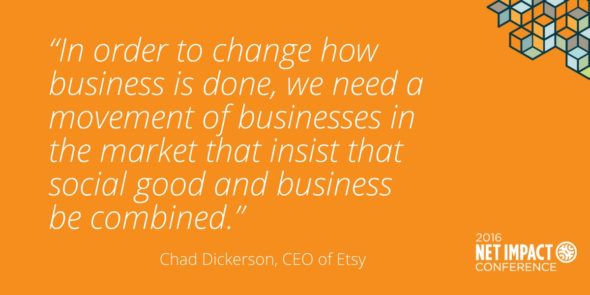During the presidential campaign, Joe Biden said the idea that corporations only exist to deliver profits to shareholders is “an absolute farce.” Companies also have a responsibility to their workers and the country. Is the debate over “corporate purpose” heading toward a change when Biden takes office?
Taking a stand against a divisive president’s most extreme policies has been an easy way for companies to demonstrate their values. But could the bar for corporate responsibility soon get higher?
We asked Stuart Bunderson, director of WashU Olin’s Bauer Leadership Center and George & Carol Bauer Professor of Organizational Ethics & Governance, and Jackson Nickerson, Frahm Family Professor of Organization & Strategy Emeritus, to weigh in.
Stuart Bunderson

Pressure to adopt a social purpose and to consider the welfare of all stakeholders is influenced more by key opinion leaders in the business community than by who is in the White House, Bunderson said.
“In recent years—years when Trump has been in the White House—we have seen seismic shifts in the conversation around business social responsibility, driven by business community A-listers like the Business Roundtable, Larry Fink/Black Rock and The World Economic Forum,” he said.
“That conversation is what has been driving change, and the trajectory and momentum of that conversation seems unlikely to be affected by who is in the White House.
“In fact, a starting premise within that movement is that business has to step in not because we have morally flawed leaders in government but because government has shown itself incapable of addressing major problems in our society due to partisan gridlock.
Under this view, business leaders have a responsibility to help solve broader societal problems because if they don’t, nobody will, he said.
“Although it would be great if Biden’s election signaled a new era in bipartisan collaboration on urgent social problems, early signs have not been encouraging. So I wouldn’t expect a change in the White House to lessen the growing conviction that businesses can and should step in where government is failing.”
Business leaders eager to score points will no longer have Trump as a punching bag for a cheap PR win.
“But most business leaders are savvy enough to know that cheap PR wins are cheap and that a reputation for social responsibility is established not through a leader’s public comments on presidential actions but by developing a track record of socially responsible action.”
Jackson Nickerson

“The federal government has been in a political tit-for-tat stalemate for decades and, as a result, has failed to respond to the fact that the American dream is now unattainable for most Americans. This failure means that the government has not adjusted its policies and come up with a new social contract for America,” Nickerson said.
“Without a new social contract, Americans increasingly appeal to the only wealthy organizations that can tackle policy problems: corporations. The fact that we’re seeing growing appeals to corporations is simply an indicator of increasingly failed politics, which largely is driven by political parties to drive fundraising and control policy.”
The widening economic gap, the climate crisis and healthcare crisis are just some of the political problems that corporations are being asked to solve, Nickerson said.
To maintain legitimacy, it’s in corporations’ best interest to respond to these demands for socially responsible actions. However, corporations have failed to recognize they also have a role—and perhaps even an obligation—to influence Congress to function properly, he said. A properly functioning government is also in business’ best interest.
“Businesses want to know the rules of the game so they can make strategic investments. They are less willing to make these investments if the rules keep changing,” he said. “And, frankly, the irony is if we don’t change the fundraising incentives of the political parties, which drive wedge issues and lead to nationalizing every congressional election, our public policies will continue to vacillate as party control of the federal government keeps switching back and forth.”
For instance, he said, the party in power provides healthcare, the other party when it comes to power later tries to take healthcare away. One party raises taxes and the other party later lowers taxes.
“Such policy vacillation is not like treading water. Instead, it causes the American dream to sink further for more Americans and reduces corporate America’s willingness to make strategic investments for growth. With lower economic growth comes further difficulty in creating a new social contract and leads to even greater demands for corporations to increase their expenditures in social responsibility. This downward spiral is a classic vicious circle”
“Once business realizes it has deep economic as well social interests in a well-functioning Congress, they will see opportunities to pressure political parties and influence government to come together and solve real problems for the American public,” Nickerson said.
Until corporate America flexes its muscles and we collectively change the way our political system functions, then demands on firms to engage in corporate social responsibility will only increase—regardless of who is in office, he said.
Sara Savat, senior news director for WashU’s Office of Public Affairs, interviewed Jackson Nickerson for this blog post.




 However, my most poignant realization at the conference came when I realized who surrounded me in the audience. In particular, those sitting within my row. Of course everyone at the Net Impact Conference had the passion, energy, and ability to make communities stronger and the world a better place. But some of the biggest heroes in my life are the ones that I see on the frontlines every day, working to continue shaping the Olin Business School, the Washington University community, and the city of St. Louis.
However, my most poignant realization at the conference came when I realized who surrounded me in the audience. In particular, those sitting within my row. Of course everyone at the Net Impact Conference had the passion, energy, and ability to make communities stronger and the world a better place. But some of the biggest heroes in my life are the ones that I see on the frontlines every day, working to continue shaping the Olin Business School, the Washington University community, and the city of St. Louis.




